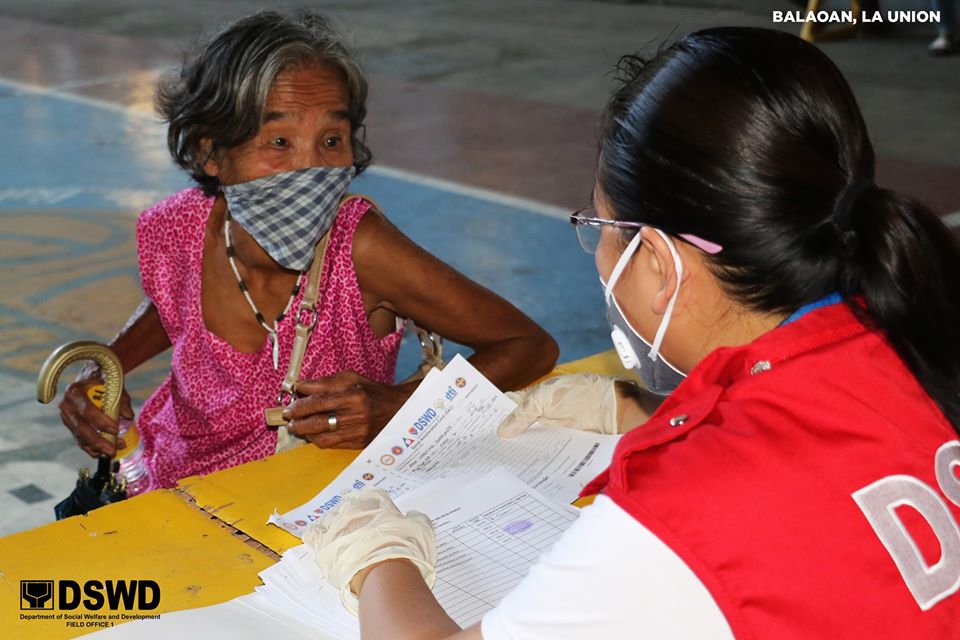The first tranche of the Emergency Subsidy Program (ESP) implementation under the Social Amelioration Program (SAP) of the government has paid a total of 777,716 beneficiaries from the 125 Local Government Units (LGUs) in Region 1. Each eligible family-beneficiary, pursuant to Memorandum Circular No. 9 series of 2020, received a cash grant of PhP5,500.00 computed based on the prevailing minimum wage of the Region. The Department of Social Welfare and Development Field Office 1 (DSWD FO 1), as the lead Agency, has strategized to expedite the implementation of the ESP.
A video teleconferencing orientation was immediately conducted with the Social Welfare and Development (SWAD) Teams and Local Social Welfare and Development Officers (LSWDOs) in the Region to set clear delineation of roles among the LSWDOs, Public Employment Service Officers, Local Government Operations Officers, and Municipal Agriculture Officers in the proper selection of beneficiaries based on Joint Memorandum Circular No. 1 and memorandum circulars from DSWD Central Office. Guidance on how to properly administer Social Amelioration Card and submission of Memorandum of Agreement and Budget Proposal were explained and discussed to the LSWDOs.
DSWD Regional Director Marcelo Nicomedes J. Castillo as the Responsible Official (RO) conducted an initial assessment with the Incident Command System – Incident Management Team (ICS-IMT) of DSWD FO 1 regarding the proper management of the emergency subsidy through SAP. As an agreement, a SAP Strike Team was created to oversee the implementation of ESP-SAP in the different LGUs of the Region.
After series of dialogue with DSWD staff and local government units, the provision of emergency subsidy to eligible beneficiaries started on 8 April 2020 in Santa, Ilocos Sur and Santol, La Union.
Field Office 1 initiatives
To satisfactorily implement the ESP, DSWD FO 1’s IMT members at the regional, provincial, and city/municipal levels were constantly updated by RO Castillo and Incident Commander Anniely J. Ferrer on policy guidance on SAP implementation. More so, the Field Office coordinated with LGUs and partner agencies to ensure that stakeholders have a common understanding as to how the said program is implemented and to proactively address emerging issues and needs at the community level.
SAP Monitoring System (SAPMS) was developed and is fully operational. It is used by identified Focal Persons from the regional and provincial levels in charge of encoding to ensure on-time reporting. Moreover, the Field Office set up a SAP Helpdesk to help LGU staff in attending to complaints and providing guidance. Strike Teams were also created to help LGUs fast track SAP payout through conducting cross-matching, validation of potential beneficiaries, and encoding of eligible beneficiaries.
LGU and partners support
The LGUs have played a vital role in the augmentation of the limited workforce capacity of the Agency as they were tapped to implement the program. Initiatives included maximizing results of the community based monitoring systems in the identification of qualified beneficiaries of the ESP.
In Pangasinan, the Local Chief Executive of Mangaldan town helped in the assessment of eligible beneficiaries including handling of complaints. An LGU-initiated grievance committee was installed by the City Government of San Carlos to address increasing issues on the beneficiary selection and investigate concerns and violations in the implementation of SAP. Meanwhile, the LGU of Bani put up a screening committee that screened and prioritized qualified beneficiaries per barangay. One on one interview with the barangay council was conducted by the LGU.
Bangar, La Union came up with a localized SAP in which non-SAP family-beneficiaries also received PhP5,500 cash subsidy. The said scheme was also replicated by the Municipality of Balaoan, La Union but with lower grant rate. Similarly, LGU Santa, Ilocos Sur’s Anti-COVID19 Crisis Assistance Program granted each non-SAP family-beneficiaries with 50-kilograms of rice, cash assistance of PhP2,000.00, hygiene packs, and additional PhP1,000.00 infant nutrition allowance.
Security of the frontliners and other assistance during the payout were ensured by the Philippine National Police and the Armed Forces of the Philippines. Minimum health standards were also observed. Some personnel of the Bureau of Fire Protection also augmented to speed up the payout.
The Philippine Information Agency Region 1, through its “Kapihan”, provided free airing interview with Dir. Castillo that served as a faster means in the dissemination of updates and clarification on the issues and concerns of SAP implementation in the Region.
Second tranche and waitlisted
The program was set to aid eligible families for the Month of April and May, but since the Enhanced Community Quarantine has been lifted in all the provinces of the Region except Pangasinan, the latter will be the only province to receive the second tranche based on Executive Order No. 112 Series of 2020. Meanwhile, 65 LGUs have submitted a total of 52,574 waitlisted or additional SAP beneficiaries subject to deduplication while 29 LGUs have refunded SAP allocation due to the excess allocation provided in their respective LGUs.
Transparency and accountability
The Agency gives credence to the local government’s capacity to select among its constituents who are deserving of the assistance; however, it does not preclude the Agency from taking necessary action whenever it is proven during the post validation phase that it did not comply with the guidelines. Thus, an inter-agency validation team which include staff from the DSWD, PNP, and the Department of the Interior and Local Government was created to check the eligibility of the beneficiaries and to see if there were duplications in the provision of the aid from the Department and other state agencies that are required to implement separate assistance under SAP.
Challenges encountered in the implementation were overcome through the good communication and coordination strategies, efforts, and support of all stakeholders involved. (by: Janine Joy B. Altero, Social Marketing Officer, Sustainable Livelihood Program)


